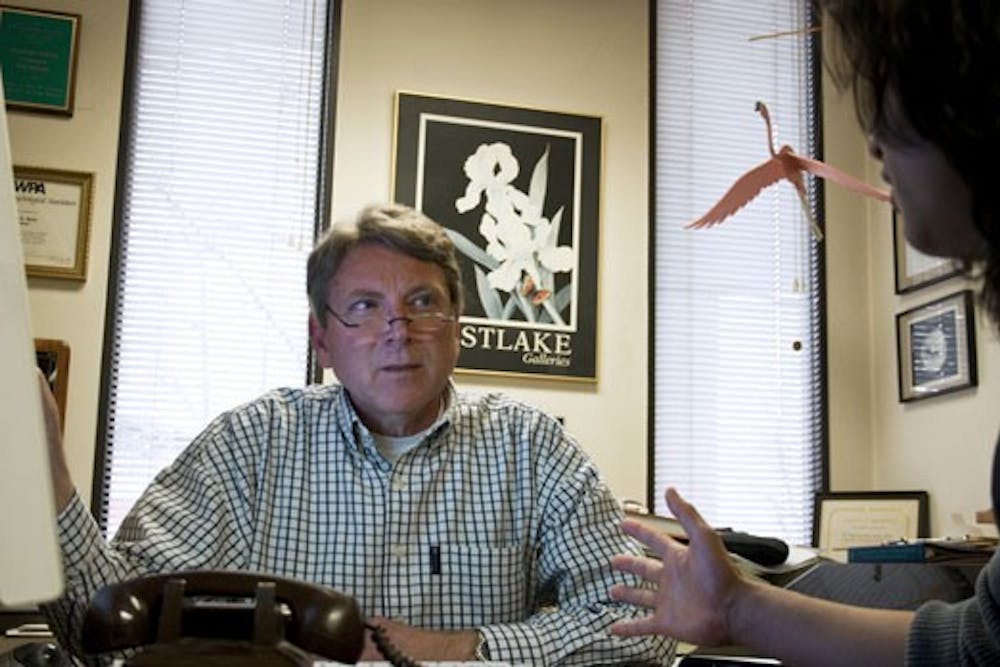At the end of every semester, students evaluate their professors and courses by filling out the ICES evalutation.
The deputy provost uses the evaluations to help determine whether a professor gets a raise, promotion or even tenure. But the results aren't public, so students don't get to see them before signing up for a class.
So some students visit Web sites such as RateMyProfessors.com, which allows them to browse reviews and comments on about 1 million professors from more than 6,000 schools.
Marcos Chavira said he has used the Web site since last semester when he had to add a 300-level class at the last minute.
"Everything seems to be pretty accurate," he said.
Students use a five-scale rating system to evaluate their professors in easiness, helpfulness, clarity and rater interest.
Get content from The Daily Lobo delivered to your inbox
Two UNM professors who received the high ratings on the Web site were glad students recommended them.
Robert DelCampo, a professor in management, said the good rating has a lot to do with his teaching style.
"I try to mix it up as much as possible," he said. "And I don't stay on any one topic for longer than 22 minutes, the length of a sitcom."
Eight students have rated Del Campo.
"This guy reminds me of a game show host," one student wrote on the Web site. "He's always upbeat and makes the class as interesting as it can be. He's cool."
DelCampo said he recently published a book that uses examples from the sitcom "The Office" to "demonstrate management parables, organizational behavior and human-resource management topics in the management classroom."
Monica Cyrino also received high ratings.
Cyrino, who teaches Greek mythology, said her style has evolved over the years.
"I have had to self-censor over the years on topics in Greek mythology," she said. "Students were particularly sensitive during the late '90s, thanks to Bill Clinton."
Over the last five years, Cyrino has worked on adding a new subfield in her area: classics in popular culture.
"It appeals to students because you can connect the ancient world to the modern world," she said. "It provides an access point to engage students."
One professor who received poor ratings on the Web site is Gordon Hodge, who teaches psychology.
Students complained that Hodge's teaching methods are boring and time-consuming.
"If you have a life or a job, skip this pompous jerk," one student wrote.
He received his poorest rating in helpfulness - a 2.6 out of five.
Hodge said students dislike the multiple quizzes they have to take for his class but insists that they help.
"When I've taught sections without the quizzes, only 40 percent of the students passed," he said. "With quizzes required, it's up to 80 percent."
Hodge said that it's important to rate instructors but doubts the Web site provides useful information.
"RateMyProfessors.com is owned by MTV," he said, "and their purpose is entertainment. A lot of people find suffering and embarrassment entertaining."
Hodge said there should be a better rating system that gauges how much students learn.
"We're not charged with being entertaining," Hodge said. "We're charged with education."
Student Katie Bransford said sites like RateMyProfessors.com are good tools for students to have, but they should be used with caution.
"There could be one opinion that really doesn't represent a professor well," she said. "There could be a really good one and a really bad one from someone else - the more people that review the one professor, the better idea you get of them."
Student Paula Gonzales said it's important that the Web site's reviews are allowed to be anonymous.
"It makes it more honest," she said. "No one's going to say something bad if their name's attached to it. But sometimes, if you're anonymous, it's just honest. And sometimes, it hurts."






